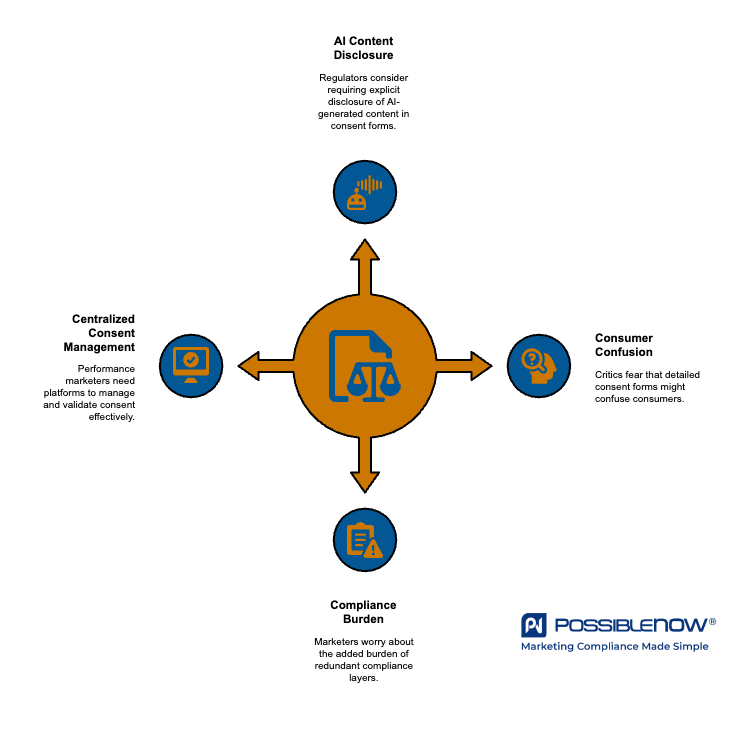Resource Center
The Future of Do Not Contact Laws
Type: Blog
Topic: Do Not Call Solution

As technology evolves, so does the complexity of regulatory compliance. The foundational principles of Do Not Contact (DNC) laws—transparency, consent, and consumer control—remain intact, but their application is shifting rapidly. With the rise of AI-generated calls, voice cloning, and automated texting, regulators are reexamining what it means to protect consumers in a world where machines can mimic humans with uncanny precision.
The FCC and FTC are leading this charge, reshaping what compliance means under the Telephone Consumer Protection Act (TCPA) and the Telemarketing Sales Rule (TSR). For organizations that communicate at scale, understanding and adapting to these developments is critical.
Speak With an Expert Today
Expanding Definitions in the Age of AI
In 2024, the FCC issued a Declaratory Ruling stating that AI-generated voices—such as those created using voice cloning or synthetic speech tools—are classified as “artificial or prerecorded” under the TCPA. This means that any outbound communication using such technology now triggers all the consent and disclosure requirements traditionally associated with robocalls.
A further rulemaking effort proposed formalizing the definition of “AI-generated calls” and adding specific disclosure requirements. These would mandate that businesses inform consumers that their consent includes the receipt of calls or messages created using AI-generated voice or content.
The regulatory trend is clear: the bar for what constitutes a compliant call is being raised to reflect the sophistication of the tools used to make it.
The Role of Consent in Future Regulations

As technology introduces new ways to reach customers, regulators are tightening the standards around consent. Under current interpretations of the TCPA, using AI-generated voices or autodialed texts requires prior express written consent.
The FCC is also considering whether consent forms must explicitly state when AI-generated content is involved. Critics argue that this could confuse consumers and burden legitimate marketers with redundant compliance layers. But the direction is clear: consent is becoming more specific, more detailed, and more central to outbound communication strategies.
For performance marketers, this aligns closely with rules that already call for brand-specific, one-to-one consent when using third-party lead generation—a requirement that can be difficult to meet without a centralized, validated consent management platform.
Proposed Exemptions and Industry Alternatives
In its recent rulemaking, the FCC acknowledged that not all AI-generated calls pose equal risk. Proposed exemptions include non-telemarketing communications made in the public interest, such as by or for individuals with hearing or speech disabilities.
The industry has also floated alternatives to hard regulation—tools that give consumers more context and control over calls. These include branded caller ID, STIR/SHAKEN call authentication, and Rich Call Data (RCD) services that display the caller’s name, logo, and reason for calling.
Other innovations under consideration include “watermarking” of AI-generated voices and whitelisting trusted AI providers—technology-driven solutions that aim to combat deception without compromising innovation.
The Push-Pull Between Innovation and Privacy
As AI reshapes how organizations communicate, the line between convenience and intrusion becomes harder to manage. AI-generated texts, for instance, generally present less risk of deception than voice clones, yet they still raise questions about consent and consumer awareness.
The next generation of DNC law will likely reflect this nuance—differentiating between use cases, communication channels, and risk levels. But marketers should not wait for clear-cut answers. The emphasis on proactive consent, transparent disclosures, and suppression of high-risk contacts is already here.
How PossibleNOW Can Help
In a compliance landscape that grows ever more sophisticated, PossibleNOW offers practical tools to help organizations reduce legal risk and maintain consumer trust. Our Do Not Call solution provides real-time suppression against federal, state, and internal DNC lists, while integrating with consent databases to align every contact with TCPA and TSR regulations.
Whether you’re navigating changes in AI regulation or managing consent across a multichannel enterprise, PossibleNOW’s DNCSolution helps you maintain compliance without slowing down your outreach strategy. As DNC laws evolve, a unified, defensible approach to compliance is more important than ever.
Request a Demo Today
About PossibleNOW
PossibleNOW is the pioneer and leader in customer consent, preference, and regulatory compliance solutions. We leverage our MyPreferences technology, processes, and services to enable relevant, trusted, and compliant customer interactions. Our platform empowers the collection, centralization, and distribution of customer communication consent and preferences across the
enterprise. DNCSolution addresses Do Not Contact regulations such as TCPA, CAN-SPAM and CASL, allowing companies to adhere to DNC requirements, backed by our 100% compliance guarantee.
PossibleNOW’s strategic consultants take a holistic approach, leveraging years of experience when creating strategic roadmaps, planning technology deployments, and designing customer interfaces. PossibleNOW is purpose-built to help large, complex organizations improve customer experiences and loyalty while mitigating compliance risk.
-
TCPA Regulations and Compliance: Complete Guide
Type: Blog
Topic: Do Not Call Solution
-
Defining Meaningful Metrics: 6 Soft KPIs to Measure Customer Preference Collection
Type: Blog
Topic: Preference Mgmt
-
Email Preference Center Best Practices
Type: Blog
Topic: Preference Mgmt
-
The Basics of DNC Scrubbing: What Is a Do Not Call (DNC) Scrubber and Why Do You Need It?
Type: Blog
Topic: Do Not Call Solution
-
What is Consent Management, How it Works, & Why it’s Important for Data Compliance
Type: Blog
Topic: Consent Mgmt
-
Do Insurance Companies Cover TCPA Damages?
Type: Blog
Topic: Do Not Call Solution
-
8 Best Practices for Capturing GDPR Consent
Type: Webinars
-
Data Silos Cause Communication Gaps
Type: Videos
Topic: Preference Mgmt
-
Difference Between Preferences & Consent
Type: Videos
Topic: Preference Mgmt
-
Integrate Do Not Call Compliance with Preferences
Type: Videos
Topic: Preference Mgmt
-
Customer Preferences Require More Than One Flavor
Type: Videos
Topic: Preference Mgmt
-
Give Customers Opt-Down Options
Type: Videos
Topic: Preference Mgmt
-
Preference Center Organization
Type: Videos
Topic: Preference Mgmt
-
Strategic Consultants Benefited Scotiabank
Type: Videos
Topic: Industry Testimonials
-
Best Practices for Managing Do Not Email Lists
Type: Blog
Topic: Do Not Call Solution
-
How Do Not Call Rules Apply to Nonprofit Organizations
Type: Blog
Topic: Do Not Call Solution
-
How to Train Your Call Center on DNC Rules
Type: Blog
Topic: Do Not Call Solution
